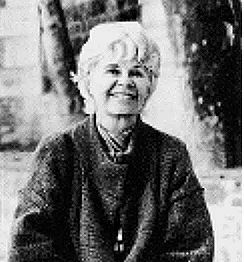Canadian Theatre Encyclopedia
Hébert, Anne

Playwright/writer born in Sainte-Catherine-de-Fossambault, Quebec, in 1916, died in Montreal, January 22, 2000.
She studied at College Notre-Dame-de-Bellevue and College Mérici, and lived in Quebec City until her mid-30s. In 1954 she moved to Paris for three years on a grant from the Royal Society of Canada, and returned there in 1965, until moving to Montreal in 1997.
In 1942, she published her first collection of poetry, Les Songes en équilibre. Between 1950 and 1954, she wrote scripts for Radio-Canada and the National Film Board. Her oeuvre includes nine novels, five poetry collections, short fiction, and plays, and has been translated into fifteen languages. Her best-known novel is Kamouraska (1970), which was adapted for film. Another novel, Les Enfants du sabbat was adapted for the stage in 2005.
Her plays are models of literariness and are far more poetic than theatrical. Three were published in a collection entitled Le Temps sauvage. The title work was produced at Théâtre du Nouveau Monde in 1966. It is a good example of the often-bleak subject matter which concerned her: a mother desperately tries to keep her family in an isolated mountainous retreat to protect it from the outside world and to keep the grown children in a childlike state -- "savage and pure." The play was translated into English by Elizabeth Mascall, and performed in Toronto in 1972 at the Firehall Theatre. A new translation by Pamela Grant and Gregory Reid, entitled "The Savage Season," is included in Anthology of Quebec Women's Plays in English Translation, Vol I (1966-1986), ed. Louise H. Forsyth (Toronto: Playwrights Canada Press, 2006).
Hébert's other plays include the radio play Les Invités au proces (Radio-Canada 1952); and a detective story for television entitled La Merciere assassinée (Radio-Canada, 1958).
She won many awards including three Governor General’s Award s (1960, 1975, 1992), the Molson Prize (1967), and honorary doctorates from four universities. She became a member of the Royal Society of Canada in 1960. In 2000, the Centre canadien culturel de Paris and Radio-Canada created a literary award in her honour.
Profile by Gaetan Charlebois and Anne Nothof
Last updated 2021-01-24

